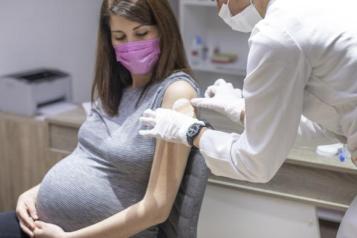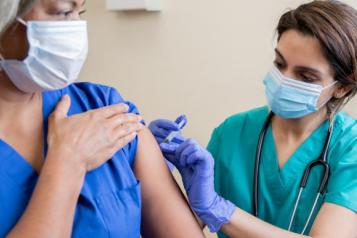COVID-19 booster vaccinations - NHS answers frequently asked questions
What is the COVID-19 booster programme?
Booster vaccines are an extra dose of a vaccine that is given to ‘boost’ the protection against a virus or disease in people who have already been vaccinated. The COVID-19 booster programme is providing an additional vaccine dose to the people most at risk from COVID-19 to ensure continued high levels of protection over the winter.
Why is the COVID-19 booster programme needed?
Like some other vaccines, protection levels from the Covid vaccines will reduce over time. Having reviewed the current data, the Joint Committee on Vaccination and Immunisation (JCVI) has recommended that COVID-19 boosters are offered to the people who are most likely to become seriously ill from COVID-19 and those who care for them in order to provide maximum protection during the winter months. The boosters will help extend the protection people got from their first two doses and reduce the risk of them needing to be admitted to hospital due to COVID-19 this winter.
The flu vaccination programme is also now running which protects people from serious complications from getting flu, so we would encourage people who are eligible for a COVID-19 booster to also get their flu vaccination. More information on the flu vaccination is at www.nhs.uk/flujab
Who is eligible for the COVID-19 booster vaccine?
As recommended by the Joint Committee on Vaccination and Immunisation (JCVI), booster vaccinations will be offered to the people most at risk of COVID-19. These are people in the nine priority groups who were vaccinated in the first phase of the vaccination programme, including:
- People who live and work in care homes for older adults
- People aged 50 and over.
- Frontline health and social care workers
- People aged 16 and over who are at high risk from COVID-19 (clinically extremely vulnerable).
- People aged 16 and over with underlying health conditions that put them at higher risk from COVID-19
- People aged 16 and over who live with someone with a weakened immune system (immunosuppressed).
- Unpaid carers aged 16 and over.
- Pregnant people in any of the above eligible groups.
People will need to have had their second dose of vaccine at least six months ago before they are offered a booster.
How do I get my COVID-19 booster?
You will receive an invitation when it is your turn, either from the NHS National Booking Service or from your GP.
To make sure the booster works as well as possible, there needs to be a gap of at least six months between your second dose and your booster. After this time, you will be invited to book an appointment at your local GP service or to choose from one of the community or pharmacy vaccination centres available on the National Booking Service. Please don’t contact the NHS before then.
Evidence shows protection from two doses declines very slowly so don’t worry if you receive your booster a few weeks after the six-month point.
Can I have my flu vaccine and COVID booster at the same time?
Yes, the evidence from the clinical trials showed that it is safe and effective to have these at the same time. However, it may not always be possible to get them together so you should have each vaccination as soon as it is offered rather than waiting to try to get them at the same time.
Which vaccines will be used for COVID-19 boosters?
In line with the advice from the JCVI, people will be given either the Pfizer or Moderna vaccines for their booster. This is because the evidence from the clinical trials on different combinations of COVID-19 vaccines showed that this type of vaccine (called an mRNA or ‘messenger’ vaccine gave the best results as a booster, no matter which type of vaccine people had before.
If you are not able to have either of these vaccines due to a severe allergy to any of their ingredients or another medical reason, it may be possible for you to have the AstraZeneca vaccine instead if you had this before but you will need to discuss this with a health professional first.
Is there anyone who shouldn’t have the booster vaccine?
There are very few people in the eligible groups who should not have a booster. If you have had a severe reaction to a previous dose of the vaccine you should discuss this with your doctor.
Why aren’t most younger people being offered a booster?
As most younger adults will only have received their second COVID-19 vaccine dose in late summer or early autumn, the benefits of booster vaccination in this group will be considered at a later time when more information is available. In general, younger, healthy individuals are expected to generate stronger immune responses from vaccination compared to older individuals.
Will there be any side effects from the booster vaccine?
As with your previous dose the common side effects are the same for all COVID-19 vaccines used in the UK, and include:
- having a painful, heavy feeling and tenderness in the arm where you had your injection. This tends to be worst around 1 to 2 days after the vaccine
- feeling tired
- headache
- general aches, or mild flu like symptoms
You can rest and take paracetamol (follow the dose advice in the packaging) to help make you feel better. Although feeling feverish is not uncommon for 2 to 3 days, a high temperature is unusual and may indicate you have COVID-19 or another infection.
Symptoms following vaccination normally last less than a week. If your symptoms seem to get worse or if you are concerned, you can call NHS 111.
Can I have the booster if I haven’t completed the first vaccination course?
No, you need to finish the first course of your vaccination.
I haven’t yet had the COVID-19 vaccination, can I still get my first jabs?
Yes, you can still get your first or second vaccination if you haven’t had yours yet. Everyone aged 16 and over can book their vaccination using the online NHS booking service or by calling 119 free of charge, anytime between 7am and 11pm seven days a week.
Can I get the booster if I am pregnant?
If you are pregnant and in one of the groups that the JCVI has recommended for the boosters, you are eligible to receive a booster, no earlier than six months after completion of the first course of vaccination. The NHS will contact you when it is your turn.
I am severely immunosuppressed. When will I get my booster?
The JCVI has recommended that people who were severely immunosuppressed at the time of their first or second COVID-19 vaccination should be offered a third dose of the vaccine. This is separate to the booster programme and is an extra ‘top-up’ dose in response to evidence showing that they may not have responded as well to the vaccine as others and will therefore have lower levels of protection against COVID-19. It includes people with leukaemia and advanced HIV and people who have had recent organ transplants.
Consultants have been asked to identify eligible patients and recommend when the best time would be for them to have their third dose. Patients are being contacted either by their consultant or GP to arrange their vaccination.


